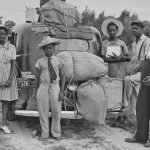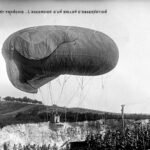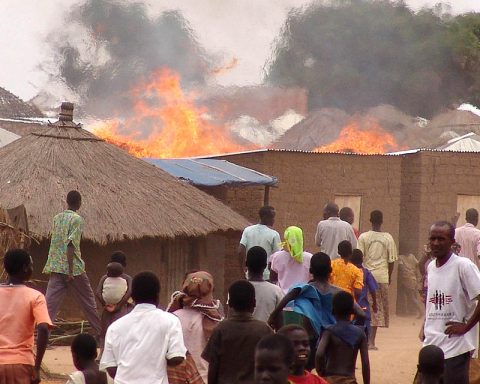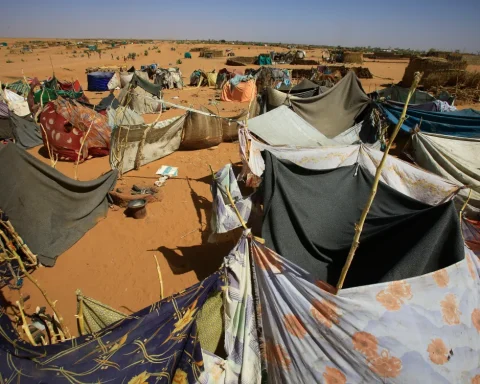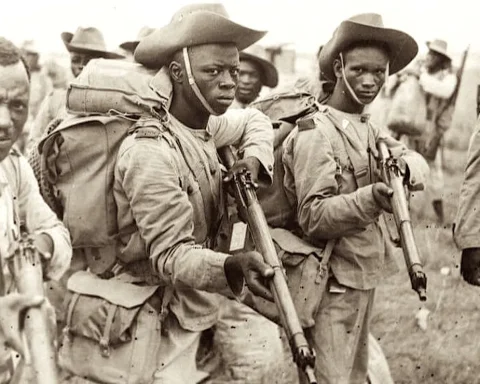World War I and World War II are often told from a European and American perspective, focusing mainly on the contributions and experiences of their forces.
However, this viewpoint overlooks a significant and often underappreciated group: African soldiers. European colonial powers recruited millions of Africans to fight in both World War I and World War II. These soldiers played vital roles in various theaters of war, yet their contributions are frequently marginalized in mainstream historical narratives. This article aims to bring to light the crucial role African soldiers played in these global conflicts, detailing their experiences and the lasting impact of their involvement.
Recruitment and Mobilization
World War I
During the early stages of World War I, European colonial powers tapped into their African colonies as sources of manpower. France, in particular, extensively recruited soldiers from its colonies, forming the “Tirailleurs Sénégalais,” which referred to African infantrymen recruited from French West Africa. More than 200,000 African soldiers served in the French army during World War I, with a significant number deployed on the Western Front and in various other theaters.
Similarly, the British recruited soldiers from their African colonies, although in smaller numbers compared to the French. The King’s African Rifles (KAR) was a distinguished British colonial regiment that included soldiers from Kenya, Uganda, Nyasaland (present-day Malawi), and Northern Rhodesia (Zambia). These soldiers played a crucial role in the East African Campaign, where they engaged German colonial forces.
World War II
During World War II, the involvement of African soldiers significantly increased. More than one million African soldiers were enlisted to fight for the Allied powers. The British and French colonial administrations once again sought assistance from their colonies. The British recruited extensively from West and East Africa, establishing units like the East African Military Labour Service and the Nigerian Regiment. The French also depended on the Tirailleurs Sénégalais, who took part in military campaigns across Europe, the Middle East, and North Africa.
Roles and Contributions
Frontline Combat
Throughout history, African soldiers have not only served as auxiliary forces but have also been actively engaged in frontline combat. During World War I, African soldiers displayed immense courage in the brutal trenches of the Western Front. The Tirailleurs Sénégalais, in particular, played a crucial role in key battles such as the Battle of Verdun and the Second Battle of the Marne. Despite facing racial discrimination and enduring tougher conditions than their European counterparts, these soldiers showcased extraordinary bravery and resilience.
In World War II, African soldiers made significant contributions to various campaigns. In the East African Campaign, African troops fought alongside British and Commonwealth forces against Italian forces in Ethiopia and Somalia. West African divisions played a vital role in the Burma Campaign, facing the challenges of jungle warfare against Japanese forces. The Nigerian Regiment, part of the British West African Frontier Force, played a notable role in the Italian Campaign, including the liberation of Rome.
Support Roles
During both World War I and World War II, African soldiers and laborers played crucial roles beyond combat. They provided essential support services such as serving as porters, engineers, medical staff, and logistics personnel. For instance, the British established the Carrier Corps in East Africa during World War I, primarily composed of African porters who undertook the challenging task of transporting supplies across rugged terrains. Similarly, in World War II, the African Auxiliary Pioneer Corps undertook vital responsibilities including constructing infrastructure, transporting goods, and ensuring the smooth flow of supplies.
Challenges and Discrimination
Despite their immense bravery and sacrifices, African soldiers encountered numerous obstacles and widespread discrimination. They were frequently subjected to stricter discipline, lower wages, and inadequate medical attention in comparison to their European peers. Racial segregation was prevalent in many military units, and African soldiers were often assigned to the most perilous and demanding duties.
The treatment of the Tirailleurs Sénégalais by the French army serves as a poignant illustration. These soldiers received lower pay than their white counterparts and were frequently denied the same acknowledgment and accolades. Following World War II, many African veterans experienced further injustice upon their return home. The Thiaroye massacre in 1944 stands as a harrowing example, where several Tirailleurs Sénégalais were ruthlessly killed by French forces as they protested for fair treatment and payment of their wages.
Legacy and Recognition
The involvement of African soldiers in the World Wars is a multifaceted tale, characterized by both bravery and oversight. Despite their crucial contributions, their role has often been overlooked in mainstream historical accounts. Nevertheless, there has been a growing acknowledgment of their impact in recent times.
Numerous endeavors have been launched to commemorate African soldiers. Notable among these are the establishment of memorials and museums, such as the Memorial to the African Soldiers in Bamako, Mali, and the Musée des Forces Armées Sénégalaises in Dakar. Furthermore, scholarly works and documentaries have emerged to illuminate their experiences, emphasizing their sacrifices and accomplishments.
Impact on Decolonization
The involvement of African soldiers in the World Wars had a profound impact on the decolonization movement. Their wartime experiences exposed them to new ideas of freedom and equality, igniting a strong sense of nationalism and a fervent desire for independence. Many African veterans emerged as influential leaders in the fight against colonial rule.
For example, Félix Houphouët-Boigny, who served in the French army during World War I, rose to prominence in the independence movement in Côte d’Ivoire and ultimately became its first president. Similarly, Jomo Kenyatta, the future president of Kenya, drew inspiration from the wartime experiences and the contributions of Kenyan soldiers.
The participation of African soldiers also shattered the colonial narrative of African inferiority by showcasing their capabilities and resilience. Their sacrifices and the injustices they endured exposed the contradictions of colonialism, fueling widespread support for independence movements across the continent.
Conclusion
The bravery and resilience of African soldiers during the World Wars stand as a testament to their immense courage and significant impact on global history. Despite enduring discrimination and harsh conditions, they played pivotal roles in various theaters of war, showcasing exceptional valor and unwavering dedication. Their involvement not only shaped the outcomes of the wars but also influenced the trajectory of the decolonization movement.
As we continue to contemplate the World Wars, it is crucial to recognize and commemorate the sacrifices and contributions of African soldiers. Their stories form an indispensable part of our shared history, warranting acknowledgment and remembrance. By doing so, we not only honor their enduring legacy but also deepen our comprehension of the global ramifications of these historic conflicts.
References
- “Nigeria’s Role in World War II Unearthed | FifteenEightyFour | Cambridge University Press”. 2020-03-23. Retrieved 2021-05-25.
- Stewart, Andrew (2016). The First Victory: The Second World War and the East Africa Campaign. Yale University Press. ISBN 9780300208559.
- sahoboss (2011-03-22). “The effects of WW2 in Africa”. South African History Online. Retrieved 2018-10-10.
- Akande, Segun. “Learn about 45000 Nigerians who fought against Hitler in WW2”. Retrieved 2018-10-10.
- “Nigeria: World War II”. World history. Retrieved 2018-10-19.
- Jackson, Ashley (2006). The British Empire and the Second World War. Continuum International Publishing Group. p. 214. ISBN 978-1-85285-417-1.
- Mockler, Anthony (2003). Haile Selassie’s War. New York: Olive Branch. p. 365. ISBN 978-1-5665-6473-1.

